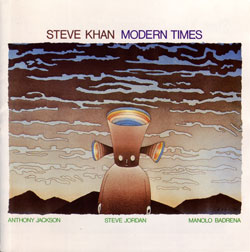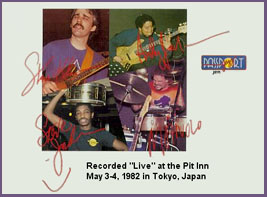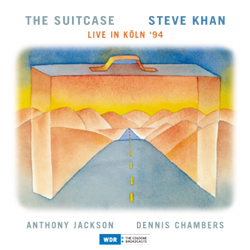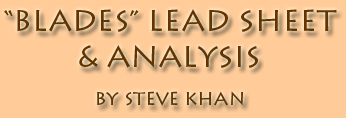Steve Khan's "Blades"
There is, at times, a great danger in spending time listening to music;
listening to the radio, and, in the end, listening to "other people's music!" As musicians, we are like sponges, and we, at times without noticing it, are absorbing, in some fashion, all that we hear around us. I believe that it takes a tremendous amount of courage to write a piece of music, because once the process begins, and you say to yourself, "I hear something," you have to believe, all or in part, that you are the first and only person that ever heard something like that. That your composition is 'original' and free of influences. Of course, in this world, that is just not going to be true. In my life, and this has happened on several occasions, after having written something and then brought it in for a rehearsal, someone usually quickly points out some portion of your tune and tells you something like: "Hey Steve, did you realize that letter [B] sounds just like 'Mary had a Little Lamb?'" When something like this happens, all you can do is laugh at yourself, and then say, "Well, I guess this wasn't exactly the most 'original' idea, but we're going to play it anyway!"
I remember all the years spent where Will Lee was one of the first people to hear and play a new tune of mine, he has such great ears and knows so many songs that everything sounds like something else to him.  And he can always be the first person to hear where your tune sounds like something else. This has a way of bringing you immediately back down to planet earth. Then you might feel like saying, "Geez, I have no idea how that little fragment got in there." Well, it is in there because, it was part of everything that you had heard and experienced over the course of your life. It could have been recently, and it could have been a long, LONG time ago too. One never knows when such things are going to just appear. But the lesson here is that you cannot allow this to stop you from writing. Write, compose!!! Don't allow the inherent dangers of not being truly 'original' to discourage you from doing it. And he can always be the first person to hear where your tune sounds like something else. This has a way of bringing you immediately back down to planet earth. Then you might feel like saying, "Geez, I have no idea how that little fragment got in there." Well, it is in there because, it was part of everything that you had heard and experienced over the course of your life. It could have been recently, and it could have been a long, LONG time ago too. One never knows when such things are going to just appear. But the lesson here is that you cannot allow this to stop you from writing. Write, compose!!! Don't allow the inherent dangers of not being truly 'original' to discourage you from doing it.
Then there are those who might say that "we all write the same three tunes over and over and over again!!" I am reminded of hearing Joe Zawinul answer a question during a press conference, where someone asked him: "Mr. Zawinul, what do you think about 'Rock'?" And to this he replied: "I don't think about it!" The question then followed, "Well, what do you listen to?" And to this he stated: "I listen to MYSELF!" Of course, sitting close-by, I could only think to myself, "Geez, what a jerk!!!" However, after spending some 7 weeks working side-by-side with him, I began to realize that, although he knew nothing about what was going on in the musical world around him, the reason he is so great, so unique, so original, is that ALL he listens to is HIMSELF. And this small revelation made me more determined to spend more time listening to MYSELF, listening to what I hear. Again, this does not have to be so extreme, but it is important.
All this serves as a preface for saying that, when I composed
"Blades," as Eyewitness was preparing to leave for Japan and make a 'live' recording of our first time playing in front of people at the Pit Inn of Roppongi, Tokyo in May of '82, I had no idea that it sounded a bit like something else. That the fundamental 'germ' for the piece, the bass and guitar line you hear at [I], sounds exactly like the smallest portion of something which appears in Chick Corea's "Sea Journey" written nearly 10 years earlier for Stanley Clarke's recording, "CHILDREN OF FOREVER"(Polydor). When I finally stumbled upon this piece of information, I felt really stupid and very unoriginal. But, lucky for me, "Blades" was already recorded and I couldn't change that. Chick's bass line is not as repetitive as mine. To these ears, it is much more clever and inventive, simply more musical. Did I "steal" something from Chick Corea? Of course not! But, it obviously was drawn from my unconscious 'bank' of musical memories. Lucky for me, I had the brilliant Anthony Jackson to take this small idea, and consistently make something far more interesting out of it.
The lead sheet which you are now viewing was only recently re-written and specifically to be shared here at Korner 2. In doing so, as I have tried to do in the past with the Eyewitness lead sheets, I have added in, here and there, portions of what Anthony improvised and added to the composed parts. And, as sections were repeated what you might 'see' on the page will not always agree with the sequence of what you hear on the CD. I might have elected to place on the lead sheet something Anthony performed on the repeat of a section because it was just so outstanding. So, just keep this in mind if you are listening and following along for the 1st time. When we performed "Blades" during those years, the 'live' versions were all about 17-minutes long. Sadly, we had to edit out a Manolo Badrena solo from this performance and mercifully we actually edited out some melodic repeats. Listening now, I can't believe that I would have wanted to have repeated some of these sections more than they are already repeated!!!
To be more specific, if you look at bars 7-8 of [A], I have included both passages which Anthony improvised. The first time through, in bar 8, he simply played an 8th-note 'D' on the and-of-two to a half-note 'D' on beat 3. But, on the repeat of the section, he played the longer line which began on the and-of-three of bar 7 and utilized two of his open strings to give it a very particular sound. The same is true of what you now see in bars 3-4 and 7-8 of [B]. I decided to include these Anthony-isms because I get so many e-mails from bassists seeking to understand the 'mind' of this singular musician, and the only explanation I can offer is the written notes. You'll have to assess the "how" and the "why" for yourselves. and the only explanation I can offer is the written notes. You'll have to assess the "how" and the "why" for yourselves.
What makes this piece of music 'work' in performance is the group's skillful attention to exaggerated dynamics. We used the full range. From our softest softs to our loudest louds, it is these extreme contrasts which contribute to the audience's enjoyment. I am reminded of the rather stupid old joke when the guitarist or drummer(I can't remember which) is told by the arranger or producer: "Could you play with more dynamics please?" And the musician responds by saying: "Dynamics? I'm playing as LOUD as I can!!!" So, in your own groups, when you're rehearsing, preparing a new piece of music, make certain that you and your bandmates are making the most out of your interpretation of the piece.
I also can't say enough about the playing of drummer, Steve Jordan. What he brings to the table can never be underestimated and it a primary reason for why our recordings remain so sought after by bassists and drummers. Steve's fills and set-ups are viewed as so 'classic' that others can't play this tune without repeating them. Apart from his own outstanding usage of dynamics, pay special attention to how he navigates all the complex figures and accents contained within letter [C]. I recall Steve pointing out to me, what he referred to as, his "Ringo cymbal." What he meant by this was that when he plays it, in a tune like this, especially during the [I2] sections, he simply beating the living crap out of it, and creating a texture which can almost only be described as 'white noise.' I'm not certain but I think that this cymbal was a very thin Paiste flat crash-ride.
As has become my custom, when re-writing these lead sheets, I have sought to include additions which have been made to the composition from live performances. Here, you can see this in the [I3] sections where there is now and stop-and-start accent in bar 9 of that 16-bar section. You will not hear this performed on the recorded version. So, don't freak-out on me about this. O.K.?
Though the soundclip we are presenting at the site does not include the guitar solo and the conclusion of the piece, I should say something about the approach to [D], the guitar solo section. Again, we are in a very 'open' section and I am using the word 'open' to indicate the harmonic freedom as much as the freedom to not be concerned about the length of time spent before moving the piece forward. Essentially, we are in an area of Abm7 and because the bass line uses the 6th(Fb) which appears in the Ab Aeolian mode, when improvising it becomes possible to interpret that harmonic area as being Aeolian or Dorian(putting to using an F#). On a cue, as the solo is hopefully building, we move to an F7 area which mirrors the original movement to [B]. This section is designed to be considerably shorter than what has appeared before and will eventually lead us to a reprise of both [B] and [C].
As I previously stated, the recorded version had a percussion solo removed, but, on the lead sheet you will see that I have left a space for this on Pg. 5 at section [E]. In recent years, as Eyewitness has toured as a trio, minus percussion, with either Dennis Chambers or Dave Weckl playing drums, this section has become a drum solo. In performance, Anthony and I may play the basic ostinato figure for awhile, but we eventually leave the stage to drummer and return to play the final sections of the tune. So, keep this in mind if you're going to try and perform the piece.
After a reprise of [A] as [A3], we move into [F] which repeats until the cued conclusion in [F2]. Here, I have also attempted to include some of the brilliant harmonic touches of Anthony Jackson. It's especially interesting to note that when Anthony plays these sections, which are really bars 9-16 of [A], [A2] and [A3], he has always played bars 9-11 with Abs. However, with the arrival of [F] he suddenly shifts and plays the actual roots of the triads I have been playing, G to Gb. On the repeats, he plays these notes in the upper register. It is so remarkable and striking because, after all the dissonance, one couldn't play something much more consonant than this and yet it somehow actually raises the intensity level. I am not at all certain that I am capable of explaining just why that happens, but it does!
For those of you who have written me about this recording, and sought to locate copies of it, I know that this has been frustrating, but I hope, now that we have shared this lead sheet with you it will only add to your appreciation of the music. Whatever notes I did actually write on the paper, they are truly nothing without the individual brilliance and ingenuity of Anthony Jackson, Steve Jordan and Manolo Badrena. I am so lucky that we were together at that moment in time to have been a group. So, to everyone, I would only encourage you to continue to write, compose and, to have the courage to bring those tunes into your rehearsals. That's the only way great things are going to happen!
Addendum: With the release in 2008 of "THE SUITCASE" a double live CD with Anthony Jackson and Dennis Chambers recorded in Köln, Germany on May 17th, 1994, originally for a WDR radio broadcast, I believe that it becomes necessary to revisit the analysis pages related to the 9 original tunes which appear. Yes, for this tune which appeared originally appeared on the "MODERN TIMES" recording from 1982, some 12 years have now passed, but the performances you will hear represent the growth of the music through live playing and improvising. In most cases, what you now hear on this CD will be much closer to the lead sheets you've been viewing since the launching of the website in September of 1998. Yes, for this tune which appeared originally appeared on the "MODERN TIMES" recording from 1982, some 12 years have now passed, but the performances you will hear represent the growth of the music through live playing and improvising. In most cases, what you now hear on this CD will be much closer to the lead sheets you've been viewing since the launching of the website in September of 1998.
This new 'live' version comes roaring out of the gate with Dennis' double bass drum pedal pounding out body-blows to the gut!!! Man oh man, it's almost overwhelming what Dennis is doing down there, but thrilling nonetheless. One of our 'live' inventions, or upgrades from the original version is that in [I3] we were playing an extended break from what you would see on Pg. 2 of the lead sheet. After the hit on the and-of-one, we don't come back in until beat 2 of the next bar. It's my sense that the written version you see was done after this tour because, after some consideration, I guess I felt that the break, as we played it, was just too long. To make the hit on beat 4 of the same bar feels better to me. But, you can decide for yourself and write and let me know. O.K.?
I also really love this particular guitar improvisation section as Anthony took things to another place. His rolling alternating octaves creates this powerful sense of motion and drive - and, when we finally make the modulation from Abm7 to F7, it is such a great relief. It is one of my favorite sections on the entire double disc set. Of course, Dennis' no-holds-barred rhythmically inventive drum solo is yet another highlight! He's just too much, and it's a thrill to have presented all of his drum solos in their complete and unedited splendor. He deserves that, and much more!!!
On a more humorous note, without saying anything to anyone, I tried to acknowledge Manolo's spirit and his absence during the [I]ntro by attempting to recreate some of his spectacular sound effects by scraping the low 'E'-string on my guitar with my thumb nail. It's not exactly as good as Manolo's sounds, but, it was my way of shouting to the cosmos that I missed having him there with us!!!
|

